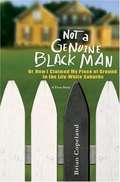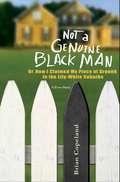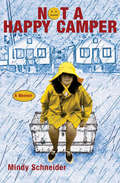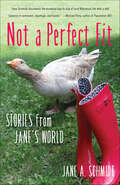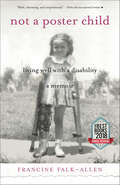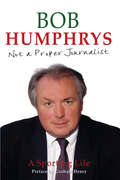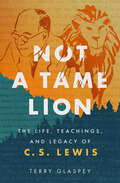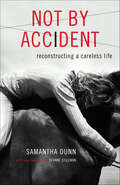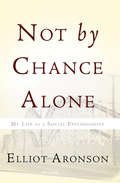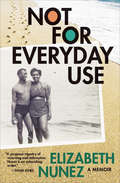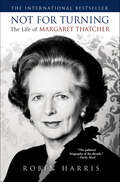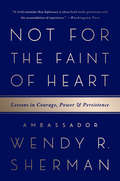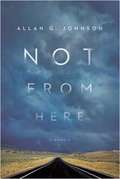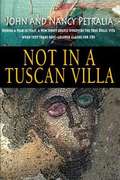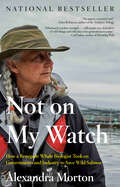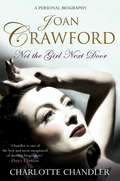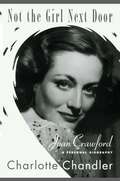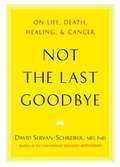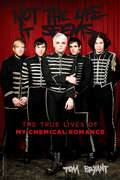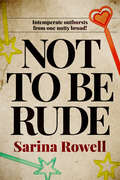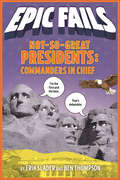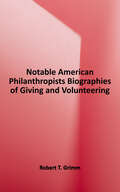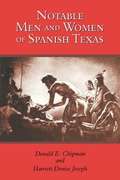- Table View
- List View
Not a Genuine Black Man: Or, How I Claimed My Piece of Ground in the Lily-White Suburbs
by Brian CopelandWhen Brian Copeland's family moved from Oakland to San Leandro, California, hoping for a better life, he had to undergo tragic difficulties of being black in a white world as a child.
Not a Genuine Black Man: Or, How I Claimed My Piece of Ground in the Lily-White Suburbs
by Brian CopelandBased on the longest-running one-man show in San Francisco history--now coming to Off-Broadway--a hilarious, poignant, and disarming memoir of growing up black in an all-white suburb In 1972, when Brian Copeland was eight, his family moved from Oakland to San Leandro, California, hoping for a better life. At the time, San Leandro was 99.4 percent white, known nationwide as a racist enclave. This reputation was confirmed almost immediately: Brian got his first look at the inside of a cop car, for being a black kid walking to the park with a baseball bat. Brian grew up to be a successful comedian and radio talk show host, but racism reemerged as an issue--only in reverse--when he received an anonymous letter: "As an African American, I am disgusted every time I hear your voice because YOU are not a genuine Black man!" That letter inspired Copeland to revisit his difficult childhood, resulting in a hit one-man show that has been running for nearly two years--which has now inspired a book. In this funny, surprising, and ultimately moving memoir, Copeland shows exactly how our surroundings make us who we are.
Not a Happy Camper: A Memoir
by Mindy SchneiderRemember those long sultry summer days at camp, the sun setting over the lake as you sang "Kumbaya”? Well, Mindy Schneider remembers her summer at Camp Kin-A-Hurra in 1974 just a wee bit differently. Not a Happy Camper chronicles a young girl’s adventures at a camp where the sun never shines, the breakfast cereal dates back to the summer of 1922, and many of the counselors speak no English. For eight eye-opening and unforgettable weeks, Mindy and her eccentric band of friends—including Autumn Evening Schwartz, the daughter of hippies, who communicates with the dead, and the sleep-dancing, bibliophile Betty Gilbert—keep busy feuding in color wars, failing at sports, and uncovering the camp’s hidden past. As she focuses on landing the perfect boyfriend and longs for her first kiss, Mindy unexpectedly stumbles across something infinitely grander: herself. Hilarious, charming, and glowing with nostalgia, Mindy Schneider’s memoir is a must-read for anyone who’s ever been to summer camp, or wishes they had.
Not a Perfect Fit: Stories from Jane's World
by Jane A. SchmidtNot a Perfect Fit is a collection of stories that are laugh-out-loud funny one minute and thought-provoking the next. Stories range from Schmidt’s experience living off-grid as the only English woman in an Amish neighborhood to family trips that are remarkably similar to National Lampoon’s Vacation. Through it all, she manages to rise above the many challenges she faces—inspiring and entertaining her audience along the way. Filled with animal antics, gratitude, mishaps, and madcap adventures, Not a Perfect Fit’s tell-all, single-girl-gone-country, down-home stories give readers permission to laugh and cry—and, most important, to carry on.
Not a Poster Child: Living Well with a Disability—A Memoir
by Francine Falk-Allen2019 Living Now Book Awards Gold Medal Winner in Inspirational/Memoir (Female) 2018 Sarton Women's Book Awards finalist in Memoir Kirkus Reviews' Best Books of 2018 2018 Sarton Women's Book Awards Silver Medal in Memoir Francine Falk-Allen was only three years old when she contracted polio and temporarily lost the ability to stand and walk. Here, she tells the story of how a toddler learned grown-up lessons too soon; a schoolgirl tried her best to be a “normie,” on into young adulthood; and a woman finally found her balance, physically and spiritually. In lucid, dryly humorous prose, she also explores how her disability has affected her choices in living a fulfilling (and amusing) life in every area—relationships, career, religion (or not), athleticism, artistic expression, and aging, to name a few. A clear-eyed examination of living with a handicap, Not a Poster Child is one woman’s story of finding her way to a balanced life—one with a little cheekiness and a lot of joy.
Not a Proper Journalist
by Bob HumphrysBob Humphrys is one of the most famous names in sports journalism. As sports correspondent of BBC Wales's flagship news programme Wales Today, he was at the centre of every major story of the past twenty turbulent years. He was there right at the heart of Ruddockgate, there on the players' balcony when Glamorgan celebrated winning a county championship, there in the Mondeo driving Joe Calzaghe to his first world title fight. In short, he was where every sports fan would love to be - as close to the action as you can get without scoring a try, taking a corner or hitting a four.Despite a life-long love affair with sport, Bob wasn't always a sports journalist. Early in his career, his brother John - the Rottweiler of Radio 4's Today programme - took him aside and told him, 'The one thing you want to avoid is covering sport - that is not proper journalism.' But the man who always read his newspaper from back to front found it hard to resist sport's magnetic pull. After his successful stints as a feature writer and current affairs reporter - encountering everyone from Argentinian presidents to Danish drug dealers and Sir Anthony Hopkins - the BBC's Wales Today came calling, and Bob quickly discovered the politics in current affairs paled into insignificance compared to the politics in sport. In Bob's first week in the job, Welsh rugby imploded with a rebel tour to South Africa - and for the next twenty years Welsh sport would lurch from triumph to disaster and back again, with Bob right there in the middle, loving every moment.Tragically, Bob Humphrys died in August 2008. But he left a magnificent epitaph: this book. In Not a Proper Journalist, the former face of Welsh sport reveals for the first time the story behind the stories. The friendships, the feuds, the glory and the heartbreak, straight from the horse's mouth. It's revealing, exhilarating, provocative and very funny - and if that's not proper journalism, brother John can eat his hat...
Not a Tame Lion: The Life, Teachings, and Legacy of C.S. Lewis
by Terry GlaspeyFinalist for the best biography of the year with Christian Book Awards.The life, thought, and legacy of C. S. Lewis—a Prophet for our TimesOne of the most brilliant minds of the twentieth century, C. S. Lewis bridged literature, philosophy, and religion. He taught at Oxford and Cambridge, all the while communicating in a clear, winsome manner that ordinary men and women could comprehend. He gave us masterpieces like The Screwtape Letters, The Chronicles of Narnia, Mere Christianity, The Problem of Pain, and still more. In this fascinating biographical study Not a Tame Lion, author Terry Glaspey points out that Lewis&’ life was as compelling as his work. Glaspey gives readers a glimpse of the character of this extraordinarily gifted man—who believed that his sharp mind and rich imagination were to be accompanied by a sense of responsibility to the wider world. If Lewis were alive today, he would see the fruition of trends he warned against many years ago. His continued relevance is based on his understanding of the human predicament—a predicament that is intellectual and moral, as well as spiritual. Lewis points the way out of this predicament, but it&’s not an easy way. It requires submission to God's authority, moral discipline, and integrity of action. Lewis shows how our lives can be lived in light of eternity and can demonstrate the hope that endures, even in these shadowlands.
Not by Accident: Reconstructing a Careless Life
by Samantha DunnSamantha Dunn used to live for the feeling of wind blowing in her hair and the powerful intoxication of her horse's steady gallop. A tug of Harley's leathery reins could instantly eradicate mounting bills, unfinished work, and the reality of a troubled marriage from her mind. But one day, as she was leading Harley across a stream in a picturesque California canyon, he panicked, knocked her to the ground, and trampled her—nearly severing her leg in the process. Dunn had always been “accident prone”—but in the aftermath of this incident, she began to analyze the details of her life and her propensity for accidents. Was she really just a klutz? Or could there be some underlying emotional reason she was always putting her life in danger? A blend of personal narrative and of research about what drives some people to have more accidents than others, Not by Accident is an insightful, incisive memoir that helps bridge the gap in understanding that exists on the concept of accident proneness.
Not by Chance Alone: My Life as a Social Psychologist
by Elliot AronsonHow does a boy from a financially and intellectually impoverished background grow up to become a Harvard researcher, win international acclaim for his groundbreaking work, and catch fire as a pioneering psychologist? As the only person in the history of the American Psychological Association to have won all three of its highest honors--for distinguished research, teaching, and writing-- Elliot Aronson is living proof that humans are capable of capturing the power of the situation and conquering the prison of personality. A personal and compelling look into Aronson’s profound contributions to the field of social psychology, Not by Chance Alone is a lifelong story of human potential and the power of social change.
Not for Everyday Use: A Memoir
by Elizabeth Nunez"Nunez ponders the cultural, racial, familial, social, and personal experiences that led to what she ultimately understands was a deeply loving union between her parents. A beautifully written exploration of the complexities of marriage and family life."--Booklist (starred review)"Through her thoughtful and articulate writing, Nunez offers a valuable perspective on the racism that she experienced, even in America, and the damage the Catholic Church does to women who follow the 'no artificial birth control' rule. Recommended for memoir enthusiasts and readers interested in Caribbean literature."--Library Journal"A celebration of understanding and empathy."--Chicago Center for Literature and Photography"Not for Everyday Use is a gorgeous tapestry of mourning and redemption. Nunez is an astonishing writer, approaching the page with both skill and heart. Her memories are well-deep and love-strong. With insights that are both sharp and tender, this is a memoir that will change the way you understand your family, and the world."--Tayari Jones, author of Silver Sparrow"Elizabeth Nunez has written a book about love: love of family, love of place, love of literature, and even the love of human flaws. Not for Everyday Use manages to be a memoir rich with tenderness that doesn't shy away from pain and loss. Reading this book was like sitting with a dear friend for a long conversation and only later realizing I'd been in the presence of a true artist. It's not easy to sound casual but attain the profound yet somehow Nunez pulls it off, page after page."--Victor LaValle, author of The Devil in Silver"Elizabeth Nunez, in a clear, unsentimental, hard-hitting, and direct voice, skillfully structures the story of a mixed-race Portuguese and Trinidadian Roman Catholic family around the preparations for her mother's funeral...At the heart of this story is the relationship between a mother and a daughter, a daughter who leaves home as a young girl to continue her education and make her life in the United States of America. Some of the most poignant moments are those in which the author describes her feelings of belonging and not belonging to 'home.' This is a story that will speak both to Caribbean people 'at home' and those who have left to make their home elsewhere."--Lawrence Scott, author of Light Falling on BambooTracing the four days from the moment she gets the call that every immigrant fears to the burial of her mother, Elizabeth Nunez tells the haunting story of her lifelong struggle to cope with the consequences of the "sterner stuff" of her parents' ambitions for their children and her mother's seemingly unbreakable conviction that displays of affection are not for everyday use.But Nunez sympathizes with her parents, whose happiness is constrained by the oppressive strictures of colonialism, by the Catholic Church's prohibition of artificial birth control which her mother obeys, terrified by the threat of eternal damnation (her mother gets pregnant fourteen times: nine live births and five miscarriages which almost kill her), and by what Malcolm Gladwell refers to as the "privilege of skin color" in his mother's Caribbean island homeland where "the brown-skinned classes...came to fetishize their lightness." Still, a fierce love holds this family together, and the passionate, though complex, love Nunez's parents have for each other will remind readers of the passion between the aging lovers in Gabriel García Márquez's Love in the Time of Cholera. Written in exquisite prose by a writer the New York Times Book Review calls "a master at pacing and plotting," Not for Everyday Use is a page-turner that readers will find impossible to put down.
Not for Turning: The Life of Margaret Thatcher
by Robin HarrisMargaret Thatcher is one of the most significant political figures of the twentieth century—a Prime Minister whose impact on modern English history is comparable only to Winston Churchill's. Like them or not, her radical policies made Britain the country it is today. And like her or not, Margaret Thatcher's legacy remains a massive political force, responsible for laying the groundwork for New Labour, Tony Blair, and David Cameron, and for England's strong political allegiance to the United States throughout the Cold War. Now Robin Harris, for many years Mrs. Thatcher's speechwriter, close adviser, and the draftsman of both volumes of her autobiography, has written the definitive book about this indomitable English woman. In this international bestseller, he tells the compelling story of her life, from humble beginnings above her father's grocery store in Grantham, her early days as one of the first women in Westminster (she became known as "Thatcher Milk Snatcher" during her time in the Ministry of Education), and then on to her groundbreaking career as Prime Minister (by which time her reputation already demanded a more powerful epithet: "Iron Lady").We follow Thatcher through hard-fought political battles and experience with her the tribulations of the English miners' strike and the Falklands War, of her sometimes troubled friendship with Ronald Reagan, and their shared staunch opposition to Communism. We learn of the political intrigue behind the scenes at Ten Downing Street. And how during one of the darkest hours of her premiership she refused to alter course and, adapting the words of an English play, declared to her enemies, inside and outside the Government, "You turn if you want to. The Lady's Not for Turning," summing up for admirers and detractors alike the defiance and consistency of Mrs. Thatcher's approach. Throughout Not for Turning we sense the passionate intellect which fuelled her ambitions, drove her into and out of one of the highest offices in the English-speaking world, and has established a unique political legacy that continues even after her death…Not for Turning is an unforgettable portrait of Britain's first female Prime Minister, written by one of her most trusted advisers, and a fitting tribute to an extraordinary politician and leader.
Not for the Faint of Heart: Lessons in Courage, Power, and Persistence
by Wendy R. ShermanDistinguished diplomat Ambassador Wendy Sherman brings readers inside the negotiating room to show how to put diplomatic values like courage, power, and persistence to work in their own lives. Few people have sat across from the Iranians and the North Koreans at the negotiating table. Wendy Sherman has done both. During her time as the lead US negotiator of the historic Iran nuclear deal and throughout her distinguished career, Wendy Sherman has amassed tremendous expertise in the most pressing foreign policy issues of our time. Throughout her life-from growing up in civil-rights-era Baltimore, to stints as a social worker, campaign manager, and business owner, to advising multiple presidents-she has relied on values that have shaped her approach to work and leadership: authenticity, effective use of power and persistence, acceptance of change, and commitment to the team. Not for the Faint of Heart takes readers inside the world of international diplomacy and into the mind of one of our most effective negotiators-often the only woman in the room. She shows why good work in her field is so hard to do, and how we can learn to apply core skills of diplomacy to the challenges in our own lives.
Not from Here, Not from There/No Soy de Aquí ni de Allá: The Autobiography of Nelson Díaz
by Nelson A. DiazRaised in the squalor of a New York tenement until he was 10 years old, Nelson Díaz saw his life change when his family moved to a brand-new high-rise project in West Harlem in the 1950s. That experience, along with lessons learned as the only Latino law student at Temple University, would drive him throughout his life as a lawyer and activist, fighting for the expansion of rights for all Americans. “No soy de aquí ni de allá” is a mantra for Puerto Ricans who feel like foreigners wherever they are and who seek a place for themselves. In his inspiring autobiography, Not from Here, Not from There, Díaz tells the story of his struggles and triumphs as his perspective widened from the New York streets and law school classrooms to the halls of power in Philadelphia and Washington, DC. Whether as a leader in economic development, a pioneer in court reform, or a champion of fair housing, Díaz has never stopped advocating for others. Díaz was happy to be the first Latino to “do something,” but he never wanted to be the last. This story of an outsider who worked his way to the inside offers powerful lessons on finding a place in the world by creating spaces where everyone is welcome.
Not from Here: A Memoir
by Allan G. JohnsonAs a white man with Norwegian and English lineage, Johnson explores both America and the question of belonging to a place whose history holds the continuing legacy of the displacement, dispossession, and genocide of Native peoples. More than a personal narrative, Not from Here illuminates the national silence around unresolved questions of accountability, race, and identity politics, and the dilemma of how to take responsibility for a past we did not create. Johnson's story--about the past living in the present; of redemption, fate, family, tribe, and nation; of love and grief--raises profound questions about belonging, identity, and place.
Not in a Tuscan Villa
by John Petralia Nancy PetraliaWhat happens if you decide to make a dream come true? Newly retired and looking for more than a vacation, John and Nancy Petralia intrepidly pack a few suitcases and head to the "perfect" Italian city. Within days their dream becomes a nightmare. After residing in two Italian cities, negotiating the roads and healthcare, discovering art, friends, food, and customs, the Petralias learn more than they anticipate--about Italy, themselves, what it means to be American, and what's important in life. Part memoir, part commentary, quirky and sincere, Not in a Tuscan Villa is about having the courage to step out of your comfort zone and do something challenging in later life. The adventure recaptures the Petralias' youth, rekindles their romance--and changes their lives forever.
Not on My Watch: How a renegade whale biologist took on governments and industry to save wild salmon
by Alexandra MortonAlexandra Morton has been called "the Jane Goodall of Canada" because of her passionate thirty-year fight to save British Columbia's wild salmon. Her account of that fight is both inspiring in its own right and a roadmap of resistance.Alexandra Morton came north from California in the early 1980s, following her first love--the northern resident orca. In remote Echo Bay, in the Broughton Archipelago, she found the perfect place to settle into all she had ever dreamed of: a lifetime of observing and learning what these big-brained mammals are saying to each other. She was lucky enough to get there just in time to witness a place of true natural abundance, and learned how to thrive in the wilderness as a scientist and a single mother. Then, in 1989, industrial aquaculture moved into the region, chasing the whales away. Her fisherman neighbours asked her if she would write letters on their behalf to government explaining the damage the farms were doing to the fisheries, and one thing led to another. Soon Alex had shifted her scientific focus to documenting the infectious diseases and parasites that pour from the ocean farm pens of Atlantic salmon into the migration routes of wild Pacific salmon, and then to proving their disastrous impact on wild salmon and the entire ecosystem of the coast. Alex stood against the farms, first representing her community, then alone, and at last as part of an uprising that built around her as ancient Indigenous governance resisted a province and a country that wouldn't obey their own court rulings. She has used her science, many acts of protest and the legal system in her unrelenting efforts to save wild salmon and ultimately the whales--a story that reveals her own doggedness and bravery but also shines a bright light on the ways other humans doggedly resist the truth. Here, she brilliantly calls those humans to account for the sake of us all.
Not the Camilla We Knew: One Woman's Life from Small-town America to the Symbionese Liberation Army
by Rachael HanelThe mystery of how an ordinary Minnesota girl came to be, briefly, one of the most wanted domestic terrorists in the United States Behind every act of domestic terrorism there is someone&’s child, an average American whose life took a radical turn for reasons that often remain mysterious. Camilla Hall is a case in point: a pastor&’s daughter from small-town Minnesota who eventually joined the ranks of radicals like Sara Jane Olson (aka Kathleen Soliah) in the notorious Symbionese Liberation Army before dying in a shootout with Los Angeles Police in May 1974. How could a &“good girl&” like Camilla become one of the most wanted domestic terrorists in the United States? Rachael Hanel tells her story here, revealing both the deep humanity and the extraordinary circumstances of Camilla Hall&’s life.Camilla&’s childhood in a tight-knit religious family was marred by loss and grief as, one after another, her three siblings died. Her path from her Minnesota home to her final, radical SLA family featured years as an artist and activist—in welfare offices, political campaigns, union organizing, culminating in a love affair that would be her introduction to the SLA. Through in-depth research and extensive interviews, Hanel pieces together Camilla&’s bewildering transformation from a &“gentle, zaftig, arty, otherworldy&” young woman (as one observer remarked), working for social change within the system, into a gun-wielding criminal involved in the kidnapping of Patty Hearst.During this time of mounting unrest and violence, Camilla Hall&’s story is of urgent interest for what it reveals about the forces of radicalization. But as Hanel ventures ever further into Camilla&’s past, searching out the critical points where character and cause might intersect, her book becomes an intriguing, disturbing, and ultimately deeply moving journey into the dark side of America&’s promise.
Not the Girl Next Door
by Charlotte ChandlerAs Charlotte Chandler did so well in her previous biographies, she will again draw on the recorded words of Joan Crawford and those who knew her well to paint a rich portrait of the woman and the star. Joan Crawford was born Lucille LeSueur in Texas in 1908. She became a chorus girl in silent films before finding her voice in Possessed (1931) with Clark Gable. Their affair would continue, on and off screen, for many years. Throughout the thirties, Joan continued to earn critical acclaim for her forte of playing career women who never gave up. Her Oscar-winning film Mildred Pierce in 1945 began the long-running feud between Joan and Bette Davis, which reached its height with Whatever Happened to Baby Jane in 1962. Joan was married four times including once to Douglas Fairbanks Jr, who spoke extensively to Charlotte Chandler for this book. Following her death, Joan's decision to cut her eldest children out of her will prompted her daughter Christina to write the damning book Mommie Dearest which changed Joan's image forever. Charlotte Chandler spent many hours recording interviews with Joan and also those closest to her. What emerges is a subtle portrait of a complex women and a new insight into the legendary actress.
Not the Girl Next Door: Joan Crawford, a Personal Biography (Applause Bks.)
by Charlotte ChandlerIn this fascinating new biography of screen legend Joan Crawford, Charlotte Chandler draws on exclusive and remarkably candid interviews with Crawford herself and with others who knew her, including first husband Douglas Fairbanks, Jr., and Crawford's daughter Cathy. As a result, this biography is fresh and revealing, a brand-new look at one of Hollywood's most acclaimed stars. Joan Crawford was born Lucille LeSueur in San Antonio, Texas, in 1908 (as she always insisted, though other sources disagreed). Her father abandoned the family, and her mother soon remarried; Lucille was now known as Billie Cassin. Young Billie loved to dance and achieved her early success in silent films playing a dancer. Her breakthrough role came in Our Dancing Daughters. Soon married to Hollywood royalty, Douglas Fairbanks, Jr. (who called her "Billie"), she was a star in her own right, playing opposite John Barrymore and a stellar cast in M-G-M's Grand Hotel. Crawford was cast opposite another young star, Clark Gable, in several films. They would sometimes play lovers on screen -- and off as well. After her marriage to Fairbanks broke up, Crawford married actor Franchot Tone. That marriage soon began to show strains, and Crawford was sometimes seen riding with Spencer Tracy, who gave her a horse she named Secret. Crawford left M-G-M for Warners, and around the time she married her third husband, Phillip Terry, she won her Oscar for best actress (one of three times she was nominated) in Mildred Pierce. But by the 1950s the film roles dried up. Crawford and Terry had divorced, and Crawford married her fourth husband, Pepsi-Cola executive Alfred Steele. In 1962, she and longtime cinematic rival Bette Davis staged a brief comeback in the macabre but commercial What Ever Happened to Baby Jane? Following Steele's death, Crawford became a director of Pepsi- Cola while she continued raising her four adopted children. Although her daughter Christina would publish the scathing memoir Mommie Dearest after Crawford's death, Chandler offers a contrasting portrait of Crawford, drawing in part on reminiscences of younger daughter Cathy among others. Not the Girl Next Door is perhaps Charlotte Chandler's finest Hollywood biography yet, an intimate portrait of a great star who was beautiful, talented, glamorous, and surprisingly vulnerable.
Not the Last Goodbye
by David Servan-SchreiberAt the start of this intimate and moving memoir, Dr. David Servan- Schreiber is returning by bicycle to his Paris home from an unsettling appointment. Following several months of fatigue and fainting spells, he had scheduled an emergency MRI. The results confirm his worst fears: the return of the cancer that he was first diagnosed with nineteen years earlier.Fully aware of what the prognosis means, he redoubles his commitment to an Anticancer diet, and complements his chemotherapy, radiotherapy, and vaccine protocols with acupuncture and yoga. At the same time, he undertakes a close assessment of his own life, realizing that he has neglected a key piece of Anticancer advice-to create a stress-free life; instead he had embarked on an international tour to take his message to the public. Nevertheless, he concludes that he would not have done it any differently.In this book, Servan-Schreiber raises many of the most complex and personal questions about how we live and how we prepare for death. Powerful, honest, and inspiring, he continually surprises with his thoughts on what's important in life and the meaning of death.
Not the Life It Seems: The True Lives of My Chemical Romance
by Tom BryantThe definitive biography of post-hardcore rock band My Chemical Romance, based on exclusive, unpublished interviews by the journalist who knew the band best. . My Chemical Romance is the Nirvana of the post-hardcore generation. As the most significant band in alternative rock on both sides of the Atlantic for the past decade, My Chemical Romance has sold five million albums and played to packed arenas worldwide. In March 2013, their sudden break-up shocked the industry and made headline news in top music media around the world. Not the Life It Seems is the true story of My Chemical Romance, a saga of the persistence, dreams, and dark forces that drive a band. Illuminated by more than twenty-four hours of firsthand interviews with the band members and those closest to them, it tells the story of an intensely private band in intimate detail.
Not to be Rude: Intemperate outbursts from one nutty broad!
by Sarina RowellNot to be Rude is a painfully assembled collection of writing by Sarina Rowell from cult humour websites The Scrivener's Fancy and Imagined Slights. Here, all in one place, for the first and last time, she goes into bat for the unfairly maligned - thirtysomething, Nicole Kidman, fashion models and being 'childless by choice'; and goes into bat against the unfairly non-maligned - tapas restaurants, second-hand booksellers, live performances and Audrey Hepburn. If you loved the BBC production of Pride and Prejudice with Colin Firth, you won't love Not to be Rude, and will, furthermore, be demonstrating your own terrible taste. 'Pretty damned funny.' -TONY MARTIN (the comedian, not the cyclist)
Not-So-Great Presidents: Commanders in Chief (Epic Fails #3)
by Ben Thompson Erik SladerFrom heroic George Washington to the dastardly Richard Nixon, the oval office has been occupied by larger-than-life personalities since 1789. The position comes with enormous power and responsibility, and every American president thus far has managed to achieve great things. However, the President of the United States is only human—and oftentimes far from perfect. While some men suffered through only minor mishaps during their time in office, others are famously remembered for leaving behind much bigger messes.In the third installment of the Epic Fails series, authors Erik Slader and Ben Thompson, and artist Tim Foley, take readers on another hilarious ride, exploring the lives, legacies, and failures of some of America’s commanders in chief.
Notable American Philanthropists: Biographies of Giving and Volunteering
by Robert T. GrimmThis book provides substantial profiles of individuals and families who made significant contributions to the American philanthropic tradition from the 1600s to the present. The volume encompasses men and women who significantly shaped American life by their dedication to voluntary service or charitable donations. The 78 entries describe 110 individuals (a number of essays describe entire families, such as the Rockefellers, Booths, and Guggenheims). Most essays are 1,500-2,500 words in length, but family entries range from 2,500-9,000 words. Each essay examines a philanthropist's early years, education, and career, and then focuses on his or her philanthropic philosophy and actions. Particular attention is paid to an individual's motivations and justifications for philanthropy. Short samples of each philanthropist's writings are included, and the important societal contributions of each individual's philanthropic activity are assessed. All entries are cross-referenced and include a bibliographic list of references (print and nonprint sources). Many feature photos, and some describe the location of personal papers and other manuscript sources. This book also includes a preface, introduction, timeline, and lists of videos and children's books on American philanthropy. Sixty scholars contributed to this volume, each of who is notable for work on certain individuals or in the broad field of American philanthropy. These contributors did a great deal of original research, making this book the only source for detailed information on many of the included individuals.
Notable Men and Women of Spanish Texas
by Donald E. Chipman Harriett Denise Joseph"In my knowledge of Spanish Texas and the Spanish Borderlands, there is no other work that covers the topic of this book. . . . No other book is so comprehensive and deals with so many personalities in one place. " -Oakah L. Jones, Historian and Professor Emeritus, Purdue University The Spanish colonial era in Texas (1528–1821) continues to emerge from the shadowy past with every new archaeological and historical discovery. In this book, years of archival sleuthing by Donald E. Chipman and Harriett Denise Joseph now reveal the real human beings behind the legendary figures who discovered, explored, and settled Spanish Texas. By combining dramatic, real-life incidents, biographical sketches, and historical background, the authors bring to life these famous (and sometimes infamous) men of Spanish Texas: ? Alvar NÚÑez Cabeza de Vaca ? Alonso de LeÓn ? Francisco Hidalgo ? Louis Juchereau de St. Denis ? Antonio Margil ? The MarquÉs de Aguayo ? Pedro de Rivera ? Felipe de RÁbago ? JosÉ de EscandÓn ? Athanase de MÉziÈres ? The MarquÉs de RubÍ ? Antonio Gil Ibarvo ? Domingo Cabello ? JosÉ Bernardo GutiÉrrez de Lara ? JoaquÍn de Arredondo The authors also devote a chapter to the women of Spanish Texas, drawing on scarce historical clues to tell the stories of both well-known and previously unknown Tejana, Indian, and African women. Donald E. Chipman is Professor of History at the University of North Texas in Denton. Harriett Denise Joseph is Professor of History at the University of Texas at Brownsville in partnership with Texas Southmost College.
